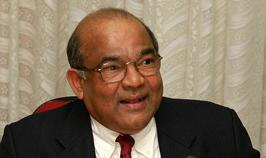
Over the last two years, we saw the memoires of two former governors of RBI. The first one by Dr. D Subbarao recounted at length with some rancour his frosty and occasionally frustrating relationship with his bosses in Delhi. Now, Dr. Y V Reddy tells his personal and professional past in an easy-going narrative (‘Advice and Dissent’) that includes several episodes of friction with political bosses all of which, however, ended amicably. In Dr. Reddy's worldview, legal and institutional arrangements defining the relationship between RBI and the government are important, but more important are the persuasive ability, professional and networking resources of the RBI leadership and some bit of luck in ensuring the smooth passage of policies and events.
On the issue of a suitable monetary policy framework, Dr. Reddy is not comfortable with the idea of a formal 'inflation-targeting' mechanism for a variety of reasons. His opinion here echoes an age-old view that inflation in India is largely a supply-side phenomenon, which coupled with the fact and political economy reality of fiscal dominance would make it almost impossible to deliver any targeted inflation.
One is not very sure on reading his memoir whether the political and bureaucratic leadership have now become self-assured and confident enough to accept professional dissent as an essential ingredient for mature decision-making. Although a larger font-size vis-a-vis the word 'advice' has been used to print 'dissent' on the front cover, Dr. Reddy has not disclosed to what extent he himself had countenanced dissent throughout his long professional life as a civil servant. Or, to what extent he was even ready for it.
Dr. Reddy's formidable intellect, his inimitable style and way of analysing issues and events, and above all, his awesome self-confidence are in full display throughout the book. His achievements in delivering reasonably good monetary and financial stability and in enhancing the institutional profile and visibility of RBI during his tenure as governor are doubtlessly noteworthy. However, in the present context, a more relevant point is - what are the lasting legacies of his tenure?
On the issue of a suitable monetary policy framework, Dr. Reddy is not comfortable with the idea of a formal 'inflation-targeting' mechanism for a variety of reasons. His opinion here echoes an age-old view that inflation in India is largely a supply-side phenomenon, which coupled with the fact and political economy reality of fiscal dominance would make it almost impossible to deliver any targeted inflation. He would bet for a self-imposed desirable level of inflation which he himself had introduced. As for the institutional set-up for monetary decision-making, he thinks that the formation of a technical advisory committee was a good innovation on his part, although one wonders how any committee or body on any major aspect of central banking can be non-technical?
The experience with inflation-targeting in India so far– although these are early days – belies Dr. Reddy's concerns on this issue. By all indications, the credibility of the RBI has gone up on this score and there is more transparency about monetary policy decisions. Equally importantly, the equation and balance of power between RBI and the government has undergone a fundamental change. Among other things, it will be increasingly difficult for the government in future to pursue fiscal policies that are at odds with the inflation target given to RBI. The chances of a serious fiscal slippage are lower now, as a consequence. Perhaps, Dr. Reddy's opposition to inflation-targeting has something to do with a preference for the 'right thing to do' vis-a-vis 'the rules' that he declares having adopted early in his career. But how does one know what is the right thing? In another time and pertaining to a different domain, Dostoevsky penned an immortal line in The Brothers Karamazov: 'if there is no God....everything is permitted.'
The stance of Dr. Reddy that permitting too many derivatives would not be appropriate, since the user corporates did not have much knowledge or expertise in handling them, is a touch condescending.
During his two tenures in RBI, it was widely known inside and outside the RBI that he and his team were not in favour of any major liberalisation of the financial markets by introducing new products and participants. Derivatives were a major concern, as he himself acknowledges. An important fact that does not find a mention in his book was that US dollar and Indian rupee exchange rate futures were grudgingly introduced in 2007 after it was known that the product was being traded in a few offshore exchanges. The stance of Dr. Reddy that permitting too many derivatives would not be appropriate, since the user corporates did not have much knowledge or expertise in handling them, is a touch condescending. Although a slew of interest rate and credit derivatives were introduced subsequently, they suffer from low volume and the resulting illiquidity.
Reforming and restructuring public sector banks is a recurring theme in Dr. Reddy's memoir in multiple contexts: permitting more ownership of domestic banks by foreign banks, reform of the financial sector, including the opening up of financial markets, fiscal consolidation etc. He very aptly identifies and articulates their weaknesses and vulnerabilities arising from poor governance, capacity and political economy constraints.
In November, 1990, Governor Malhotra skilfully parried a media question whether as many as eight public sector banks were insolvent then by saying: ‘You are assuming something that we haven’t put forward’. Twenty seven years later, the same ones, excepting New Bank of India, which does not exist anymore, are believed to be insolvent. Clearly, something has been seriously amiss in the regulation and supervision of RBI during these years.
The memoir of Dr. Reddy is immensely readable for both lay readers and policy- practitioners. It contains a wealth of information and is a trove of anecdotes. Its lasting value will be in enhancing and enriching RBI's institutional memory of an era replete with important and watershed events.
(The writer is a former central banker and consultant to the IMF)



